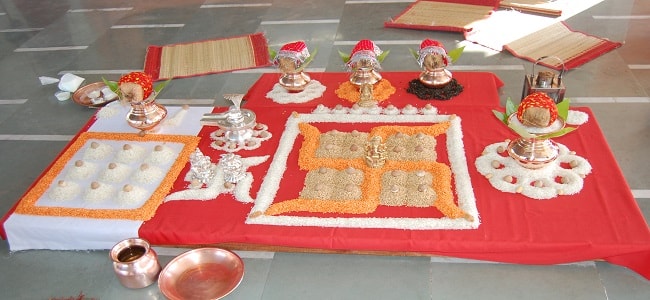Ujjain, a spiritual beacon in Madhya Pradesh, India, is celebrated for its profound connection to Vedic traditions and its sacred Mangalnath Temple, revered as the birthplace of Lord Mangal (Mars). This ancient city, situated along the holy Kshipra River, is the epicenter for the Mangal Bhat Puja, a powerful Vedic ritual designed to alleviate the adverse effects of Mangal Dosha, an astrological condition that can disrupt marriage, career, and personal well-being. This 800-word article explores the significance of Mangal Dosha, the spiritual importance of performing Mangal Bhat Puja Ujjain, the detailed ritual process, and the life-changing benefits it offers.
What is Mangal Dosha?
Mangal Dosha, commonly known as Manglik Dosha, is an astrological affliction in Vedic astrology that occurs when Mars is placed in the 1st, 2nd, 4th, 7th, 8th, or 12th house of an individual’s birth chart. Mars, a planet symbolizing energy, ambition, and aggression, can exert a malefic influence when positioned unfavorably, leading to challenges such as delayed marriages, marital discord, financial instability, health issues, or emotional volatility. Individuals with this dosha, referred to as Mangliks, are often advised to perform remedial rituals to pacify Mars’ negative effects. In some cases, marrying another Manglik is recommended to balance the planetary energies.
The term “Mangal Dosha” reflects Mars’ potential to create turbulence in one’s life, often linked to karmic imbalances. The Mangal Bhat Puja, a rice-based worship ritual, is a revered remedy that seeks to appease Mars, restoring harmony and fostering prosperity for the devotee.
Why Ujjain for Mangal Bhat Puja?
Ujjain holds unparalleled significance for the Mangal Bhat Puja due to its association with the Mangalnath Temple, believed to be the birthplace of Mars as per ancient scriptures like the Matsya Purana. The temple, dedicated to Lord Shiva, houses a Shivling that symbolizes Lord Mangal, making it a potent site for rituals aimed at neutralizing Mars’ influence. Ujjain’s unique geographical position, where the Tropic of Cancer passes through, is believed to amplify the cosmic energy of Mars, enhancing the efficacy of the puja.
The Kshipra River, flowing near the temple, adds a layer of spiritual purification, as devotees bathe in its waters before the ritual. Ujjain’s legacy as a center for Vedic astrology and its community of skilled pandits ensure that the Mangal Bhat Puja is performed with authenticity and precision, making it the preferred destination for devotees worldwide seeking relief from Mangal Dosha.
The Mangal Bhat Puja Ritual
The Mangal Bhat Puja is a meticulously structured Vedic ceremony, typically lasting 2-3 hours, conducted at the Mangalnath Temple. The term “Bhat” refers to rice, a key offering in the ritual. Performed by experienced pandits, the puja follows a series of steps to appease Mars and invoke divine blessings. Here’s an overview of the process:
- Cleansing and Preparation: Devotees begin by taking a purifying bath in the Kshipra River at nearby ghats like Ram Ghat. Men wear traditional attire such as a dhoti or kurta-pajama, while women wear sarees or traditional dresses, avoiding dark colors like black or blue. Fasting on the day of the puja is recommended, and oil should not be applied to the hair.
- Sankalp and Invocation: The ritual commences with a sankalp, where the devotee declares their name, gotra, and the purpose of the puja, such as resolving marital delays or career obstacles. If the gotra is unknown, the pandit may use Kashyap gotra. This is followed by invoking Lord Ganesha to remove obstacles.
- Navagraha Worship and Kalash Sthapana: The nine planets are worshipped through a Kalash ritual, with special emphasis on Mars. The Kalash, filled with water and sacred items, symbolizes divine energy.
- Shivling Abhishek: The core of the puja involves offering rice (bhat), red flowers, belpatra, sandalwood paste, and Panchamrit (a mixture of milk, curd, ghee, honey, and sugar) to the Shivling representing Lord Mangal. This act signifies devotion and the surrender of Mars’ negative influences.
- Mangal Mantra Jaap and Havan: The pandit chants Mars-specific mantras, such as “Om Ang Angarkaya Namah” or “Om Mang Mangalaya Namah,” 108 to 1,000 times using a Rudraksha or coral mala. A havan (fire ritual) is performed, with offerings of ghee, black sesame seeds, and wood to cleanse negative energies.
- Final Offerings and Aarti: The puja concludes with a Shiva aarti, followed by the distribution of prasad, which may include rice, sweets, or a Rudraksha mala. Feeding the needy on this day is considered highly meritorious.
The puja is ideally performed on auspicious days like Tuesdays, Amavasya, or as per the Vedic muhurat, determined by an astrologer for optimal results.
Benefits of Mangal Bhat Puja
The Mangal Bhat Puja offers profound spiritual and material benefits for those affected by Mangal Dosha:
- Marital Bliss: The ritual mitigates delays in marriage, resolves conflicts, and promotes compatibility, ensuring a harmonious married life.
- Career Success: It removes professional obstacles, paving the way for career growth and financial stability.
- Health and Emotional Balance: The puja alleviates health issues caused by Mars, such as stress or injuries, and reduces emotional volatility like anger or impulsiveness.
- Family Harmony: It fosters peace and unity in familial relationships, resolving disputes and misunderstandings.
- Spiritual Growth: The ritual enhances positivity, clarity, and spiritual alignment, helping devotees lead a balanced life.
For severe cases of Mangal Dosha, additional remedies like Kumbh Vivah (for women) or Ark Vivah (for men) may be recommended to further neutralize the dosha.
Conclusion
The Mangal Bhat Puja in Ujjain is a transformative Vedic ritual that offers a pathway to overcome the challenges of Mangal Dosha. Performed at the sacred Mangalnath Temple, where the divine energy of Lord Shiva and Mars converges, this puja harnesses Ujjain’s spiritual potency to restore balance and prosperity. By entrusting the ritual to skilled pandits and approaching it with devotion, devotees can unlock a life of harmony, success, and spiritual fulfillment.


